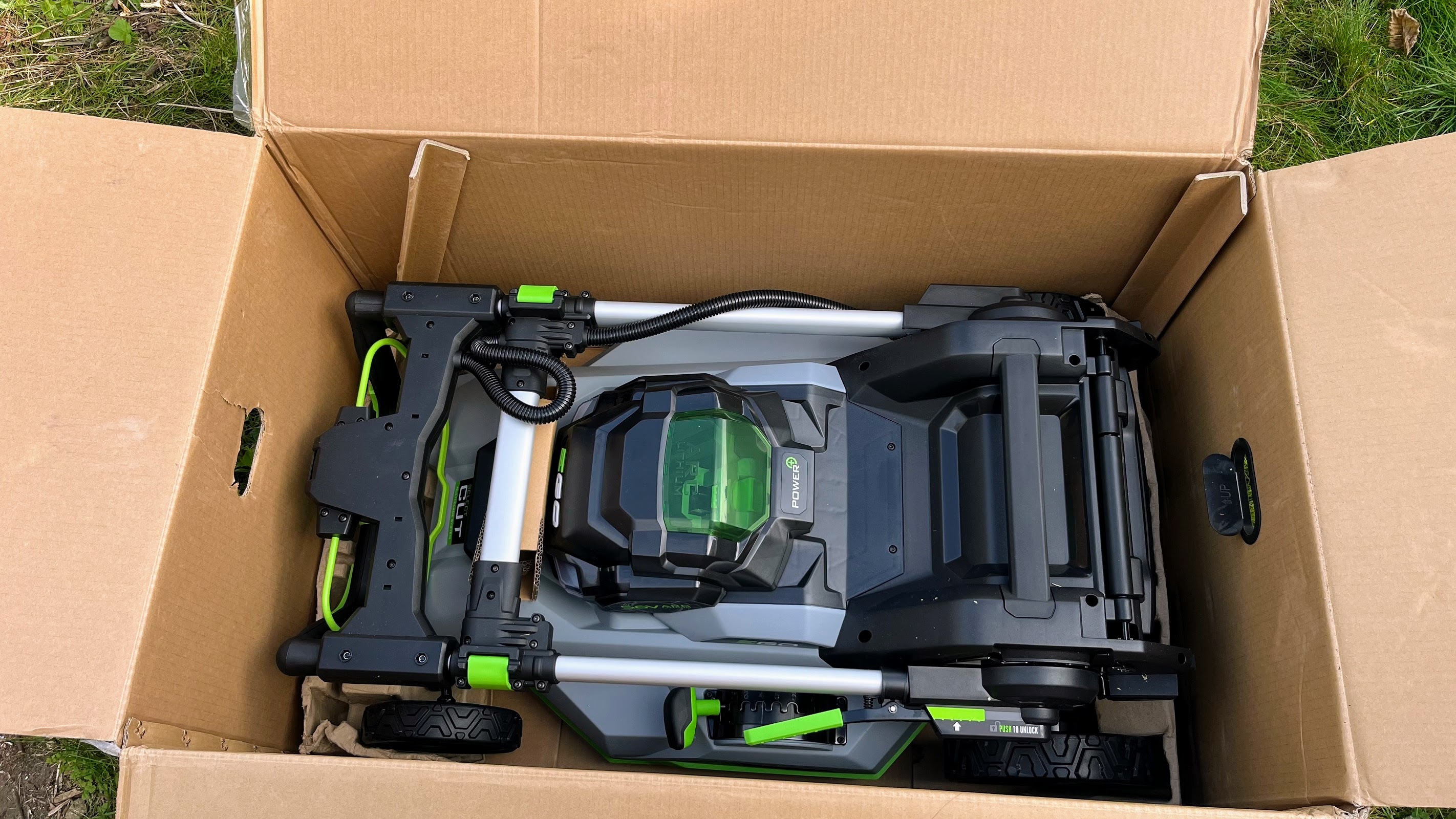Before buying one of the best lawnmowers, you must address a few key questions to ensure you can choose the right one.
It’s natural to be drawn to buy a mower with features that appeal to you, or that pleases your eye. These factors are valid – but you shouldn’t make your purchase at first sight.
Many variables related to lawn mowers, your lawn, and your needs will determine whether a particular mower model suits you. These range from the type of mower and its power source to in-depth details such as the cutting action.
In this guide, I’ll discuss the key factors to consider before buying a lawn mower.
Along the way, lawn mower expert Jimmy The Mower and Gtech gardening enthusiast Lucy Rhead will offer advice to help you make an informed choice.
Things you should know before you buy a lawn mower
How big (exactly) is your lawn?
Most lawnmower models have a maximum recommended mowing area, often given in square yards in the product specifications.
This matters because mower features are often fine-tuned to this particular specification. These include the cutting width (or ‘cutting swath’), which means the lawn width the mower can cut in one pass, and the capacity of the grass collection box.
If you buy a lawn mower designed to cut a smaller area than your lawn, you may find that the grass collector box fills up quickly, and you’re unable to mow efficiently. On the other hand, if you buy a mower made to mow lawns larger than your own, you may find it challenging to maneuver the machine around the edges of the lawn – and the mower will likely take up more storage space than is necessary.
So, measure your lawn area and determine its size in square yards before choosing a lawn mower.
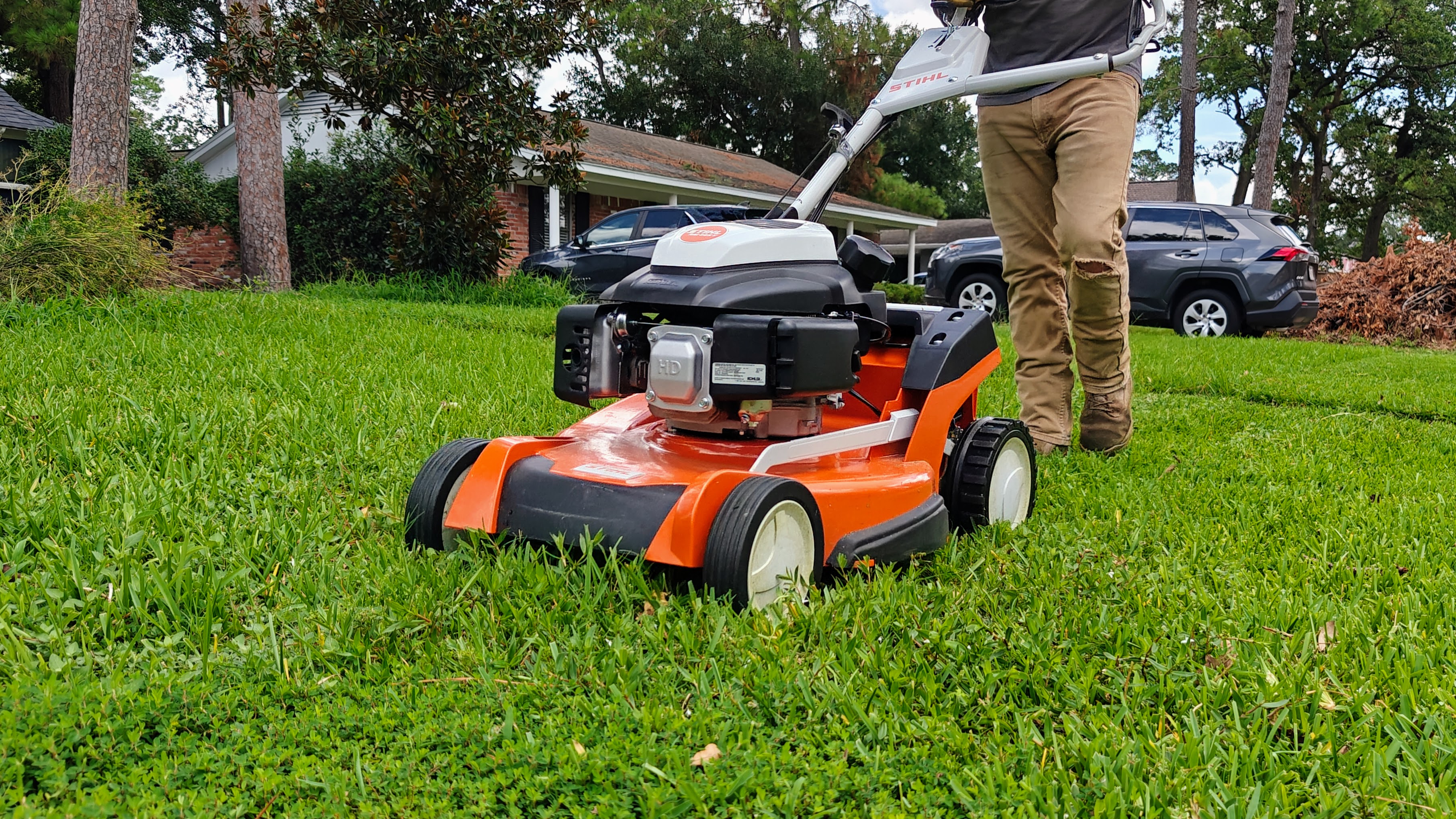
Gas mowers have special requirements
You might want a gas-powered lawn mower for a few good reasons.
Gas mowers tend to appeal to mechanically minded users and often have very good cutting performance. Unlike electric mowers, which need an available household power supply or a charged-up battery, a well-maintained gas mower can always be trusted to mow when you need it—as long as you have a supply of fuel handy.
However, using a gas mower involves some added ongoing requirements. For instance, you’ll need to replace components such as the spark plug regularly and perform routine checks and maintenance on engine components. These tasks are beyond the confidence and proficiency levels of some owners.
Electric mowers have their own pros and cons
For most users, an electric mower – powered by either a rechargeable battery or household electricity – will be a convenient, low-maintenance choice.
That said, electric motors have their own special requirements. If you get a cordless electric mower, you’ll need to charge the battery between uses to ensure it can provide enough power the next time you need to mow.
Meanwhile, corded electric mowers have a trailing power cable that can get in the way while you cut the grass, requiring extra vigilance to ensure your safety while mowing. On the plus side, corded mowers tend to be lightweight and budget-friendly.
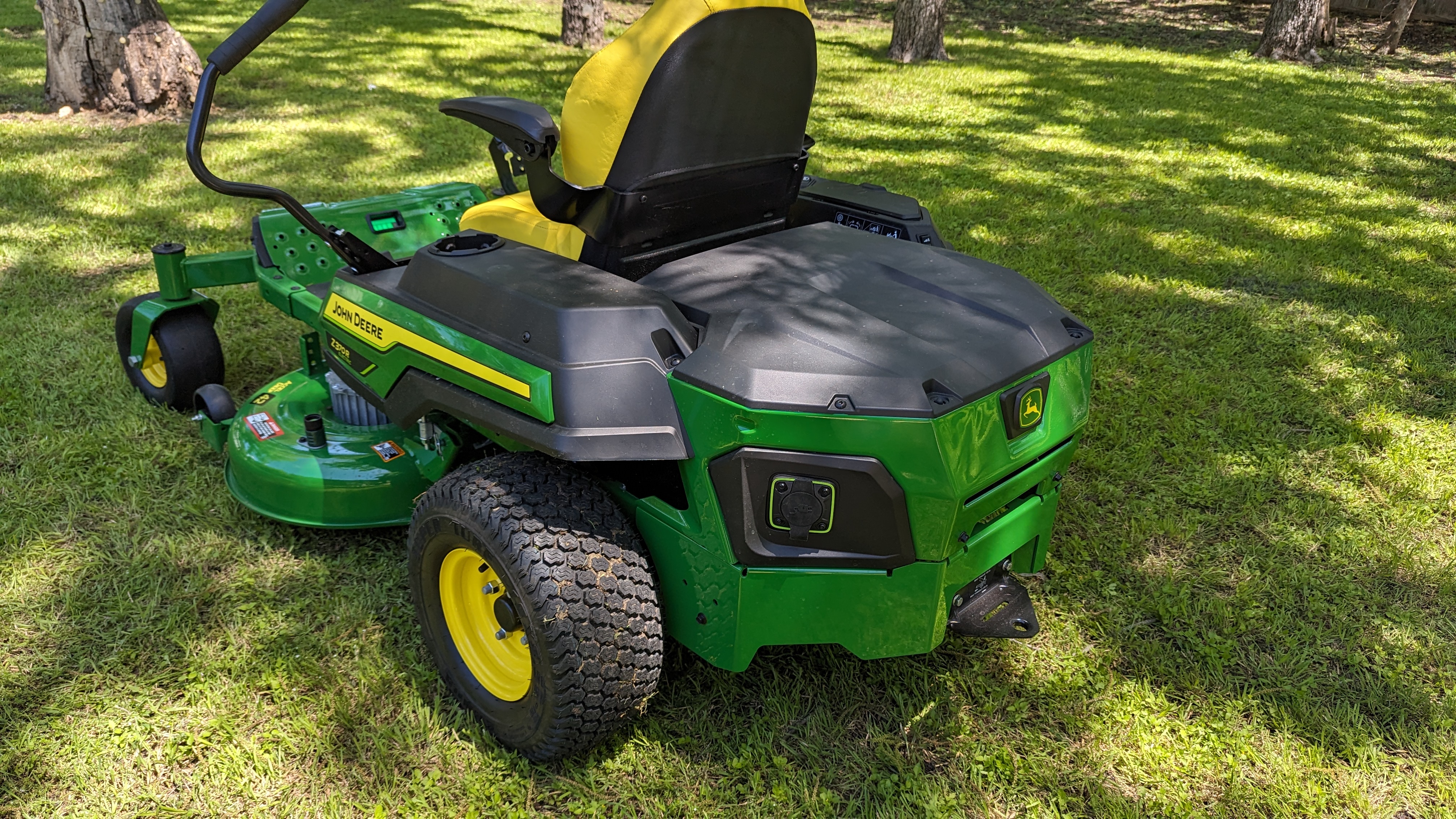
Not all ride-on mowers are made equal
Ride-on mowers (AKA ‘riding mowers’) are essential for users with a very large lawn that needs to be mowed efficiently. You might think of them as a single mower category, but there are a few kinds of ride-on mowers to choose between.
Most domestic users choose a lawn tractor. This type of ride-on mower looks pretty much like a scaled-down agricultural tractor, and most models can tow various ride-on mower attachments, including dethatchers, scarifiers, spreaders, and trailers.
Another type of ride-on mower, zero-turn lawn mowers, incorporates a hydraulic system that allows you to change direction while the mower stays in place, making it much easier to mow large areas neatly.
“Using a zero-turn model changes things,” says lawn mower expert Jimmy The Mower.
“The engine is sat behind you, there’s an underslung deck, and you have two large wheels plus two caster wheels. Instead of grass collection, there’s just side discharge or mulching.
“It’s a big change, as mulching is good for the grass in the summer, but in winter, you sometimes get too much moisture, which causes problems such as fungal disease,” he says.
According to Jimmy, the best type of mower you can get – if you’re seeking the perfect lawn – is a ride-on cylinder lawn tractor.
“I use one daily, and they’re finely built machines,” he says.
“Ride-on cylinder mowers like bowling greens are made to cut fine turf. They have a better cut and finish than a mower with a rotary blade that bashes the grass and cuts it with brute force.”

Jimmy The Mower is a lawn care professional and prominent turf industry influencer. Thousands of lawn enthusiasts subscribe to Jimmy's YouTube channel, which features honest gear reviews and how-to guides.
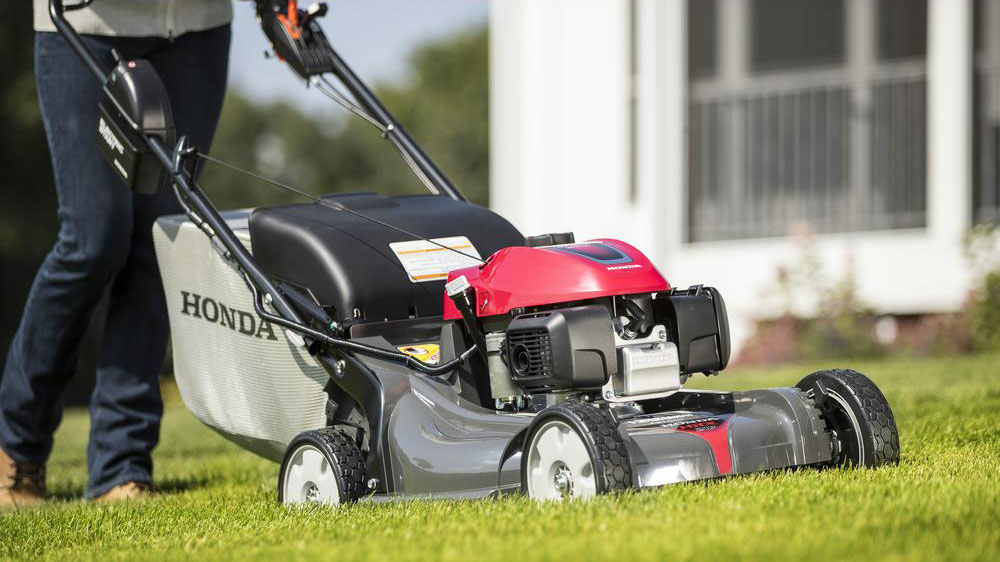
5. Self-propulsion can help with hills
Self-propelled lawnmowers feature a drive system as well as a powered mowing blade. Because these mowers can propel themselves across the lawn surface, you don’t need to push them – you just do the steering.
For this reason, self-propelled mowers are very helpful for mowing on hilly terrain. Whereas using a regular ‘push lawn mower’ on slopes can be very strenuous, a good self-propelled mower takes the physical effort out of the task.
A self-propelled model could also be a smart choice for users who struggle with hard physical work or have impaired mobility. However, the onboard drive system on these mowers tends to make them relatively heavy, so you’ll need to ensure there’s a clear route between your lawn and wherever you store the mower.
With all that said, self-propelled mowers have their downsides. In particular, they often come at a high up-front cost – so you need to be sure you want self-propelled functionality before buying one.
“A key consideration before buying a lawnmower is knowing which type is best for you – and there are several kinds available, each suited to different needs and preferences,” says Lucy Rhead, Gardening Enthusiast at the yard tool brand Gtech.
“A push lawn mower [without self-propulsion] is best suited for those with a small to medium-sized garden and can either be petrol-powered or electric, while self-propelled lawn mowers are better suited for larger lawns with tougher or uneven terrain,” she says.

As Gardening Enthusiast at the lawn tool brand Gtech, Lucy Rhead advises consumers on a wide array of gardening practices, including lawn care and vegetable growing. Gtech is a leading manufacturer of battery-powered electric lawn tools (and vacuum cleaners), beloved by gardeners in the UK and US.
There are a few different lawn mower cutting actions
Most lawnmowers have a rotary cutting action. Within their cutting deck, a blade rotates rapidly and cuts the grass.
Rotary mowers are okay for most users, although they don't produce the finest cut. For a professional-grade mow, you might consider buying a cylinder lawn mower. These mowers cut grass using a cylindrical array of blades.
A rotary blade cuts grass like a machete, while a cylinder mower cuts the grass more like scissors. The result of cylinder mowing is a more finely cropped lawn – but on the flip side, you’ll pay more for the mower.
Brand is important
Visit an online retailer such as Amazon, and you’ll find plenty of appealing, low-priced lawnmowers made by unfamiliar-sounding brands.
These mowers often work well, but some buyers encounter problems when they try to replace a component or get help from customer support. If you buy from a newly established brand, you can’t always count on a ready supply of spare parts or service availability.
For greater peace of mind, choosing a mower made by a long-established brand that is easy to contact and trades on its reputation is better.
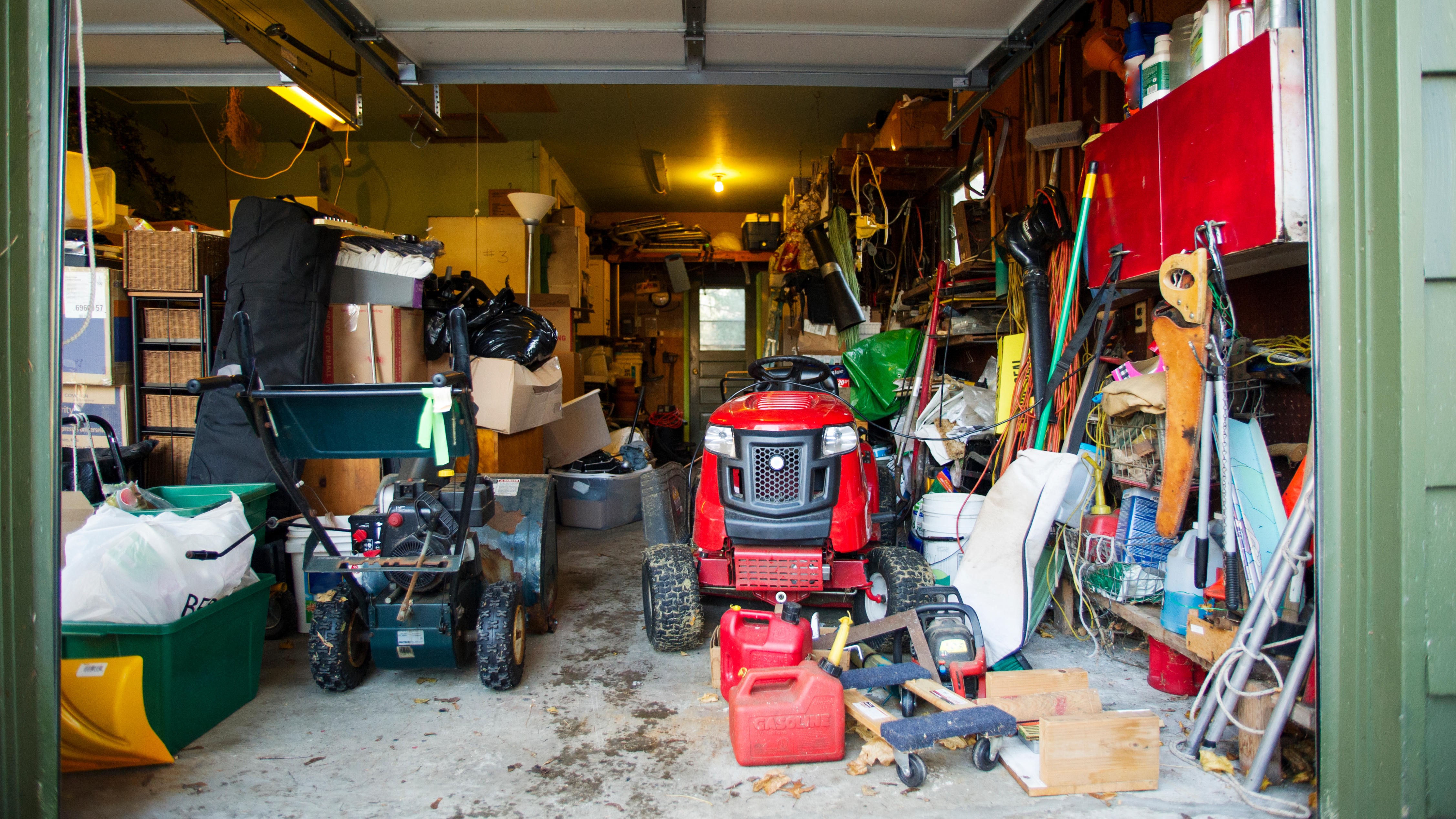
You’ll need a good place to store your lawn mower
Lawnmowers spend most of their time in storage. The suitability of your chosen storage place will greatly affect the mower's longevity and performance.
Mower storage should be easy to access so you won’t feel reluctant to take the mower out and use it. The storage place should be dry and sufficiently well-insulated to ensure the temperature doesn’t fall below freezing.
As you prepare your yard for winter, you will likely put away your mower for a long period. To prevent water ingress, you may choose to cover the mower with a waterproof sheet, such as a tarp.
Lawn mowers are often sold at discounted prices
If you can wait a little while before buying your lawn mower, you should be able to take advantage of a discount in one of many seasonal sales held throughout the year by various retailers.
Great times to buy a mower include the Black Friday weekend or during retailer-specific sales such as Amazon’s Prime Day events. Lower mower prices also tend to become available around the end of the mowing season, when retailers aim to clear out their stock, allowing new models to launch the following year.
FAQs
What is the best type of lawn mower for most users?
Every lawn and person is different, and no ‘one-size-fits-all’ type of mower will perfectly suit all users.
With that said, if you’re an ordinary domestic user who cares mostly about value and convenience, then a cordless electric push lawn mower with a rotary cutting action will probably be your best bet.
“Ultimately, the best lawnmower for you depends on several factors, including the size of your lawn, your budget, and how you want to fuel it,” says Lucy.
“A lightweight cordless push lawn mower is a great option for most homeowners as they are eco-friendly, and the convenience of cordless power makes them ideal for small and medium-sized lawns.”
That said, plenty of folks are now turning to a (relatively) new and lower-effort solution for mowing their lawn: robotic lawnmowers.
“These automated mowers cut your lawn while you relax, making sure to avoid any obstacles by using built-in sensors to detect them,” says Lucy.
How long should my lawn mower last?
A lawn mower’s lifespan will depend on several factors, including its type, quality, and how it is used and maintained.
You’re buying for the long term. Most mowers are built to last for at least five years, and many will keep working much longer, provided they are properly maintained and stored.
If you’re concerned about a mower's likely lifespan, try to find out the length of warranty offered by its manufacturer. Many mowers come with a warranty of up to five years. If a mower doesn’t come with a warranty, that should raise some concerns about its build quality.
